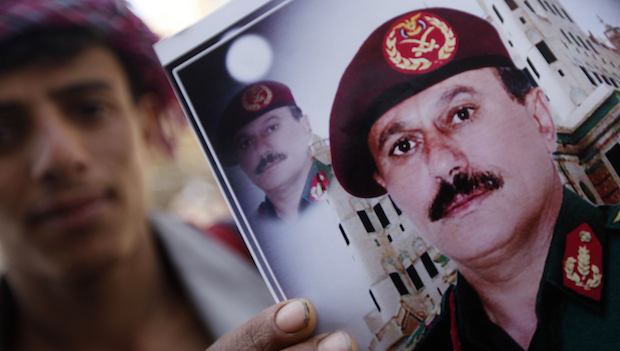UN Security Council Resolution 2140 is being billed both as the helping hand that Yemen’s democratic transition needs and as further evidence of international interference in Yemen’s internal affairs.
The resolution, passed on February 26, sets up a three-person committee that will judge whether individuals have obstructed the political transition in Yemen or impeded the implementation of the outcomes of the National Dialogue Conference, among other things.
No individuals are named in the resolution, and the committee will report back at a later date on who will be internationally sanctioned. However, it will come as a fairly big surprise if former President Ali Abdullah Saleh and his former Vice-President Ali Salim Al-Beidh, also the leader of the Southern movement Al-Hirak, are not mentioned.
Sanctions against Saleh, justified by portraying him as a saboteur of Yemen’s democratic transition, have been on the cards for a while. Behind the scenes, Yemen’s President Abd Rabbuh Mansur Hadi is known to have been calling on the international community to place sanctions on Saleh. Hadi knows Saleh still has the money and influence to cause problems—and potentially even stage a political comeback for either himself, or more likely his son, Ahmed Ali Saleh.
The last time sanctions against Saleh were mentioned, early in 2013, he came out angrily, attacking the UK and saying it still thought of Yemen as one of its colonies.
Things have gone further this time. Once again, the UK has played a leading role in pursuing sanctions against Saleh. But this time it has gone further than merely discussing the possibility: a UN resolution that will likely result in Saleh having some form of economic sanction placed upon him has now been passed.
The UN regards Yemen as one of the success stories of the Arab Spring and a rare recent example of the UN Security Council uniting and broadly agreeing on an issue. Needless to say, with an increasingly weak central government, a disastrous security situation and a faltering economy, many Yemenis take umbrage at the idea of their transition being some sort of example to other states in similar circumstances.
It appears that the UN Security Council has been convinced that if it wants this “success story” to have a happy ending and not descend into a civil war or a failed state, then it must act against figures posing problems for the current Yemeni leadership.
In Yemen itself, many of Saleh’s opponents who took to the streets in 2011 have welcomed the move by the UN—some to the point of outright gloating. There is the impression that Saleh got off easy for the ascribed to him during his 33 years in power, especially those committed against protesters in 2011. Granted immunity from prosecution by the Gulf Cooperation Council deal that brought Yemen back from the brink and negotiated his exit, Saleh is now referred to as “the leader” by his supporters and still lives freely in the capital, Sana’a.

A vendor poses with images of former President Ali Abdullah Saleh (bottom) in Sana’a on March 1, 2014. (REUTERS/Mohamed al-Sayaghi)
Opponents of the former president now hope that the real threat of sanctions will mean the end of Saleh’s political career and no role for his family in any future government.
This is wishful thinking for some. Many have pointed out that Saleh has had plenty of time since sanctions were first mooted to hide his assets and prepare for what is to come. In this scenario, economic sanctions might not have a great effect, and Saleh would be able to portray himself as immune to the threats of the international community.
Aside from Saleh, the possibility that Beidh will be included on the list of those to be sanctioned may increase his popularity in the restive South, as it did when he was last mentioned with regards to sanctions. Beidh is far from universally popular in the South, even among fellow separatists, but any sanctions could give him the opportunity to present himself as a martyr to the Southern cause.
Finally, the impression that foreign powers, especially Western ones, are propping up the Yemeni government may backfire for Hadi and Co. The message that Yemen is handing over its sovereignty is already being spread by anti-Hadi media outlets. Though Hadi may be able to remove the threat of Saleh and Beidh with these latest moves, he may simultaneously be opening up a few more problems for himself.
This article was originally published in The Majalla.
All views expressed in this blog post are those of the author and do not necessarily represent the views of, and should not be attributed to, The Majalla magazine or Asharq Al-Awsat newspaper.
